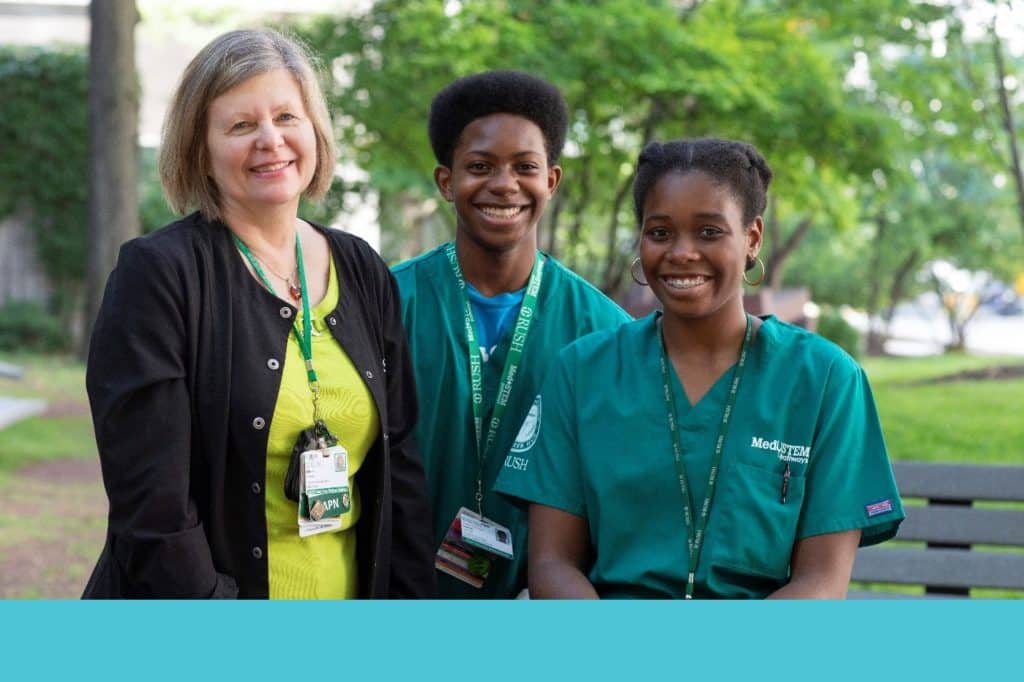July 6, 2019
“I love hosting interns — I find it’s really a benefit,” says Shirley Ambutas, MSN, DNP, clinical nurse specialist at Rush Rehabilitation. This summer, her team is hosting two interns from Rush’s MedSTEM Pathways program, which brings 180 hand-selected high school students to Rush University Medical Center and Rush Oak Park Hospital for six weeks of learning about health care careers and developing skills for succeeding in college.
Some of their lessons take place in classrooms, but a lot also happens in clinical and non-clinical department settings. Ambutas talked with us about what interns learn, and what their hosts learn as well (Hint: Many high schoolers are really good at technology).
Has your department hosted interns before?
This is our third year — we had SAME interns in the last year of that program, and MedSTEM Pathways interns last summer in the first year of that program. Some of our interns have returned for more than one year, which is great — the returnees have skills, have gained some maturity and can help mentor the new group.
What do you think are the most important lessons Rush interns learn?
One is how to multitask; that’s really important. Also really important is the art of conversation and how to interact with people, which is key no matter what profession you ultimately decide on.
We ask all our patients what they want to accomplish here, and then write it on the whiteboard in their room; that’s a great icebreaker for interns. We coach them to introduce themselves, explain that they’re here for the summer and here to help with care, and ask the patient what matters most to them. They learn how to be creative in communicating with people who’ve lost speech after a stroke, or who speak a different language.
You have to give them guidance; we always have tasks for them, but we also have them do things they might not be comfortable with. That’s how they grow and learn resilience. If I have a student who wants to be an internal medicine physician but isn’t comfortable talking to people, she’s going to have to learn that.
Besides interacting with patients, what are some of the tasks your interns help with?
They do a lot that we really appreciate. We have a stash of clothing for people who need to use the gym but don’t have exercise clothes; interns help with organizing that. They run errands between departments, help put together flyers and other documents — whatever clerical help we need. And they are a big help with our Fun Fridays … especially when we get phone karaoke going in patients’ rooms.
As you observe your interns, what are some of the things you see them keying into?
They get to see nurses at work, see doctors doing rounds, see physical therapists working with patients, help with patients and animals when pet therapists come in. All those interactions are helpful to get them thinking, “Do I want to be a therapist helping people get their muscles back — helping them learn to comb their hair and wash up again? Maybe I want to be a nurse who helps bring all the care together. Maybe I want to be a doctor.” You can see them getting past what they see on medical TV shows and getting a more realistic view.
And do you and your team learn things from your interns, too?
We had a 20-year-old patient with a spinal cord injury who couldn’t use his hands. He wanted to listen to Pink Floyd. I’m not good at Spotify, so we had an intern help out … did you know Spotify has voice activation?
Ambutas encourages her Rush colleagues to get involved with the MedSTEM Pathways program. Interns and pre-interns are on campus now, and you can help them in any of the following ways.

